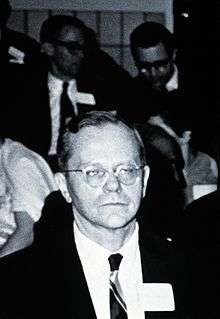William Trager

William Trager (20 March 1910, Newark, New Jersey – 22 January 2005[1]) was an American parasitologist. Trager was noted for his research of malaria.
He received from Rutgers University in 1930 his B.Sc. and then from Harvard University in 1931 his master's degree and in 1933 his Ph.D. under the direction of L. R. Cleveland.[2] Trager was a postdoc for one year in the Department of Animal Pathology in the Princeton Division of the Rockefeller Institute, working on insect physiology and pathology in the laboratory of Rudolph W. Glaser (1888–1947). Trager was then appointed in 1934 to the staff of the Rockefeller Institute in Manhattan, where he remained until his retirement.[3] In the 1940s Trager developed an in vitro system to culture Plasmodium lophurae from ducks. In the 1970s Trager and a student, James Jensen, perfected what they called the "candle jar method" for continuous culture of Plasmodium falciparum.[4]
Awards
- 1986 Manson Medal[5]
- 1994 Prince Mahidol Award[6]
References
- ↑ IISC obituary
- ↑ New York Times obituary
- ↑ Sherman, Irwin W.; Simpson, Larry (2005). "In Memoriam: William Trager (1910–2005)". The Journal of Eukaryotic Microbiology. 52 (3): 173–176. doi:10.1111/j.1550-7408.2005.00038.x.
- ↑ Janovy, John; Esch, Gerald W., eds. (2016). A Century of Parasitology: Discoveries, Ideas and Lessons Learned by Scientists Who Published in The Journal of Parasitology, 1914–2014. Chichester: John Wiley and Sons, Ltd. pp. 13–14.
- ↑ "List of past medal holders". Royal Society of Tropical Medicine and Hygiene.
- ↑ "List of winners". Prince Mahidol Award Foundation. Retrieved June 9, 2014.